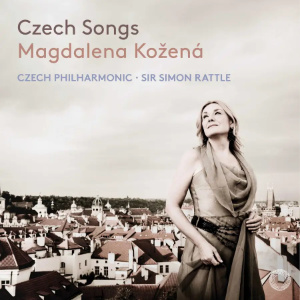
Czech Songs
Bohuslav Martinů (1890-1959)
Nipponari, H68 (1912)
Songs on One Page, H294 (1943) orch 1997 Jiří Teml (b.1935)
Antonín Dvořák (1841-1904)
Evening Songs, Op.3 (1880) three songs orch Jiří Gemrot (b.1957)
Songs, Op.2, Nos 2 and 6 B123, B124 (1881-82)
Hans Krása (1899-1944)
Four Orchestral Songs, Op.1 (1920)
Gideon Klein (1919-1945)
Lullaby (1943) orch Jiří Gemrot (b.1957)
Magdalena Kožená (mezzo-soprano)
Czech Philharmonic Orchestra/Sir Simon Rattle
rec. 2022/23, Dvořák Hall of the Rudolfinum, Prague
Texts in Czech and English translation
Pentatone PTC5187077 [61]
For their recording of Czech Songs, Magdalena Kožená and Simon Rattle have turned up some oddities. Martinů’s early Nipponari has been recorded but is seldom encountered on disc whilst Hans Krása’s Four Orchestral Songs is, if anything, even rarer. Then there is the question of the orchestrations. Martinů’s Songs on One Page was orchestrated back in 1997 by Jiří Teml whilst three of Dvořák’s Evening Songs, the two songs from the Songs, Op.2, and Gideon Klein’s Lullaby are the much more recent work of Jiří Gemrot. This, then, is a disc that needs quite a bit of sifting.
Nipponari – Martinů’s ‘Japanese Folk Songs’ – though composed in 1912 was premiered several years after his death, in Brno. This is a work most associated on disc (it has a negligible performance history) with Dagmar Pecková whose 1988 disc with the Prague Symphony Orchestra and Jiří Bělohlávek has been pretty much the only recording to get. Kožená’s mezzo is still the distinctive instrument of old and the Gallic intimacy of the orchestration, its chamber-like refinement, fuses with a native Czech melancholy in the second song, Old Age, which she sings very finely. If I had to choose between the performances I’d say that Rattle seeks out the late-Romanticism in the score whereas Bělohlávek brings a tarter, more personalised sense of the music’s folkloric elements. So, finely though Kožená sings, in Old Age, for example, there is rather more regret in Pecková’s little vocalese at the end than Kožená finds in it and the same is true of the accompaniment. Both performances are fine but Bělohlávek penetrates the deeper.
Kožená has recorded Songs on Two Pages with Martin Martineau for DG but this is her first recording, so far as I know, of Songs on One Page, albeit in this orchestrated version. These brief little vocal sketches – none is longer than two minutes – offer fresh-faced charm. One might think that the orchestration would slow the vocal line but that’s not the case; it’s mobile and attractive, not least No.4 The Footpath. An errant ‘n’ in the track listing has converted At Mother’sinto At Motherns. For those averse to this orchestrated version a safer bet would be the original so try Supraphon SU4235-2 where you’ll also find Songs on One Page, the New Slovak Songs and the New Chap-Book, with Martina Janková and Tomáš Král, anchored by the ever-splendid pianist Ivo Kahánek.
There are five Dvořák songs from the set of twelve Evening Songs, Op.3, three orchestrated, as I noted above, by Jiří Gemrot. Kožená sings them out of sequence, which is fine by me as they’re not sung as a set and it makes more evocative sense this way. The stormy No.7, therefore, When I Looked into the Sky is richly burnished whilst I Am that Knight, (No.3) is the most operatic with its high, but highly compressed, drama. It’s noticeable that the most gripping orchestrations are the composer’s own, which is hardly Gemrot’s fault, and wholly predictable. Kožená’s best singing comes in No.2, I Dreamt Last Night. Gemrot’s horn writing in the second of the selected Op.2 songs, No.6, My Heart Often Broods in Pain is, however, finely conceived and Kožená’s vocal plangency aided by her characteristic vibrato.
Krása’s Orchestral Songs date from 1920 when he was 21 and are taut settings showing Zemlinksy’s expressionist influence. The orchestration is clear-cut and precise nonetheless and for an Op.1, however compressed, it’s admirable. Gemrot’s orchestration of Gideon Klein’s Lullaby is subtle and apposite – it’s a Ukrainian-Jewish melody, written in Terezin for voice and piano.
Texts provided in the useful booklet are in Czech with English translation. The recording quality in the Dvořák Hall of the Rudolfinum is excellently balanced.
As a survey of some Czech songs this is a successful album but it has problematic elements inbuilt that may not appeal to all. A small paragraph on the back of the packaging says that ‘many of these songs are presented here in rarely-heard orchestrations, enhancing the colourful nature of these works’. That is both the album’s strength and its Achilles’ heel and it depends very much on how much intervention you are willing to put up with in Martinů and Dvořák.
Jonathan Woolf
If you purchase this recording using a link below, it generates revenue for MWI and helps us maintain free access to the site




















